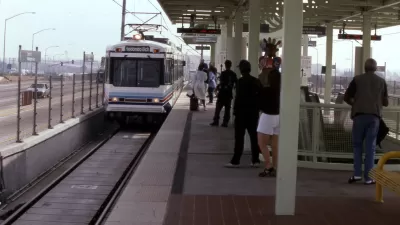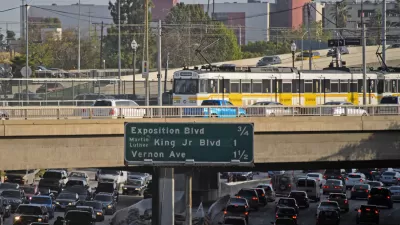Was not enough transit spending the culprit for the narrow rejection of Los Angeles County's Measure J initiative, which aimed to speed up construction of a host of the region's transit projects from 30 to 10 years? Damien Newton thinks so.
The forces aligned against Measure J, the proposed extension of L.A. County's half cent sales tax dedicated to funding transportation projects, were an odd mix of bus advocates, and opponents of highly local projects. Counterintuitively, however, points out Newton, "the organized campaign against Measure J wasn't an anti-transit one.
If anything, it was an anti-highway, anti-gentrification, and
pro-transit operations campaign that included an element that is also
opposed to the Westside Subway. The elected officials opposed to the tax
extension complained that not enough was being spent on transit in the
areas they represent."
"It's an article of faith among Metro Board Members and many in the media
that ballot measures need to have freeway funding to pass, but most of
the opposition to Measure J was because not enough was being spent on
transit projects and operations," argues Newton.
In an interesting postscript, with hundreds of thousands of provisional ballots yet to be counted, the County Registrar's Office flagged
Measure J as a "close contest," as of Wednesday. According to Spokeswoman Monica Flores,"[t]he number we have left
could potentially change the outcome of [the measure],"
which appeared to have failed by less than 2 percentage points.
FULL STORY: Measure J’s “Rejection” Was NOT an Anti-Transit Vote

Maui's Vacation Rental Debate Turns Ugly
Verbal attacks, misinformation campaigns and fistfights plague a high-stakes debate to convert thousands of vacation rentals into long-term housing.

Planetizen Federal Action Tracker
A weekly monitor of how Trump’s orders and actions are impacting planners and planning in America.

In Urban Planning, AI Prompting Could be the New Design Thinking
Creativity has long been key to great urban design. What if we see AI as our new creative partner?

King County Supportive Housing Program Offers Hope for Unhoused Residents
The county is taking a ‘Housing First’ approach that prioritizes getting people into housing, then offering wraparound supportive services.

Researchers Use AI to Get Clearer Picture of US Housing
Analysts are using artificial intelligence to supercharge their research by allowing them to comb through data faster. Though these AI tools can be error prone, they save time and housing researchers are optimistic about the future.

Making Shared Micromobility More Inclusive
Cities and shared mobility system operators can do more to include people with disabilities in planning and operations, per a new report.
Urban Design for Planners 1: Software Tools
This six-course series explores essential urban design concepts using open source software and equips planners with the tools they need to participate fully in the urban design process.
Planning for Universal Design
Learn the tools for implementing Universal Design in planning regulations.
planning NEXT
Appalachian Highlands Housing Partners
Mpact (founded as Rail~Volution)
City of Camden Redevelopment Agency
City of Astoria
City of Portland
City of Laramie




























